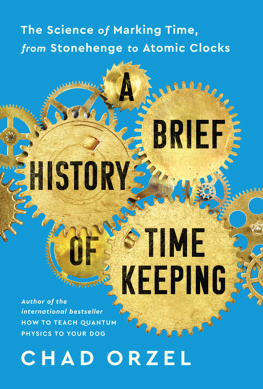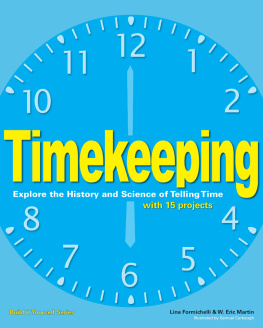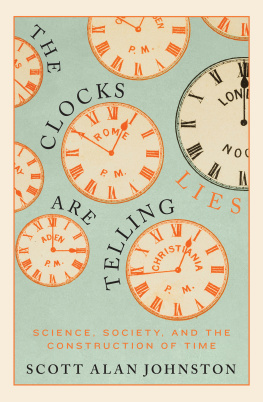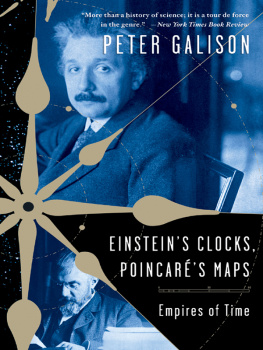Chad Orzel - A Brief History of Timekeeping: The Science of Marking Time, from Stonehenge to Atomic Clocks
Here you can read online Chad Orzel - A Brief History of Timekeeping: The Science of Marking Time, from Stonehenge to Atomic Clocks full text of the book (entire story) in english for free. Download pdf and epub, get meaning, cover and reviews about this ebook. City: Dallas, year: 2022, publisher: BenBella Books, genre: History. Description of the work, (preface) as well as reviews are available. Best literature library LitArk.com created for fans of good reading and offers a wide selection of genres:
Romance novel
Science fiction
Adventure
Detective
Science
History
Home and family
Prose
Art
Politics
Computer
Non-fiction
Religion
Business
Children
Humor
Choose a favorite category and find really read worthwhile books. Enjoy immersion in the world of imagination, feel the emotions of the characters or learn something new for yourself, make an fascinating discovery.
- Book:A Brief History of Timekeeping: The Science of Marking Time, from Stonehenge to Atomic Clocks
- Author:
- Publisher:BenBella Books
- Genre:
- Year:2022
- City:Dallas
- Rating:3 / 5
- Favourites:Add to favourites
- Your mark:
A Brief History of Timekeeping: The Science of Marking Time, from Stonehenge to Atomic Clocks: summary, description and annotation
We offer to read an annotation, description, summary or preface (depends on what the author of the book "A Brief History of Timekeeping: The Science of Marking Time, from Stonehenge to Atomic Clocks" wrote himself). If you haven't found the necessary information about the book — write in the comments, we will try to find it.
Booklist
A thorough, enjoyable exploration of the history and science behind measuring time.
Foreword Reviews
Its all a matter of timeliterally.
From the movements of the spheres to the slipperiness of relativity, the story of science unfolds through the fascinating history of humanitys efforts to keep time.
Our modern lives are ruled by clocks and watches, smartphone apps and calendar programs. While our gadgets may be new, however, the drive to measure and master time is anything butand in A Brief History of Timekeeping, Chad Orzel traces the path from Stonehenge to your smartphone.
Predating written language and marching on through human history, the desire for ever-better timekeeping has spurred technological innovation and sparked theories that radically reshaped our understanding of the universe and our place in it.
Orzel, a physicist and the bestselling author of Breakfast with Einstein and How to Teach Quantum Physics to Your Dog continues his tradition of demystifying thorny scientific concepts by using the clocks and calendars central to our everyday activities as a jumping-off point to explore the science underlying the ways we keep track of our time. Ancient solstice markers (which still work perfectly 5,000 years later) depend on the basic astrophysics of our solar system; mechanical clocks owe their development to Newtonian physics; and the ultra-precise atomic timekeeping that enables GPS hinges on the predictable oddities of quantum mechanics.
Along the way, Orzel visits the delicate negotiations involved in Gregorian calendar reform, the intricate and entirely unique system employed by the Maya, and how the problem of synchronizing clocks at different locations ultimately required us to abandon the idea of time as an absolute and universal quantity. Sharp and engaging, A Brief History of Timekeeping is a story not just about the science of sundials, sandglasses, and mechanical clocks, but also the politics of calendars and time zones, the philosophy of measurement, and the nature of space and time itself.
For those interested in science, technology, or history, or anyone whos ever wondered about the instruments that divide our days into moments: the time you spend reading this book may fly, and it is certain to be well spent.
Chad Orzel: author's other books
Who wrote A Brief History of Timekeeping: The Science of Marking Time, from Stonehenge to Atomic Clocks? Find out the surname, the name of the author of the book and a list of all author's works by series.













